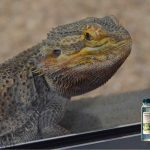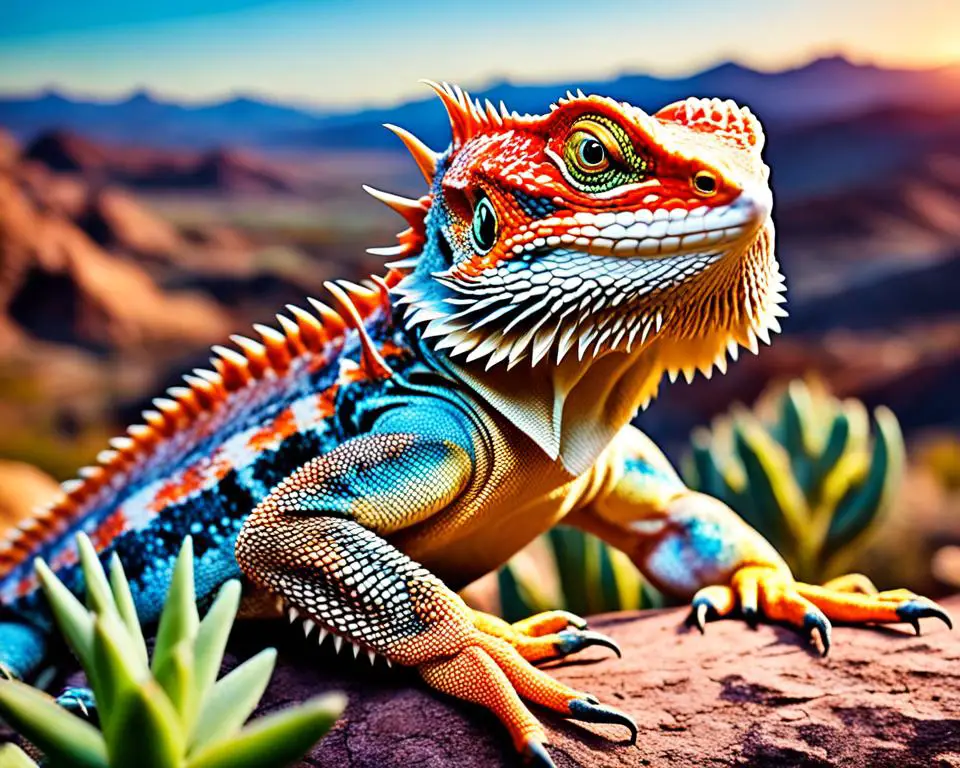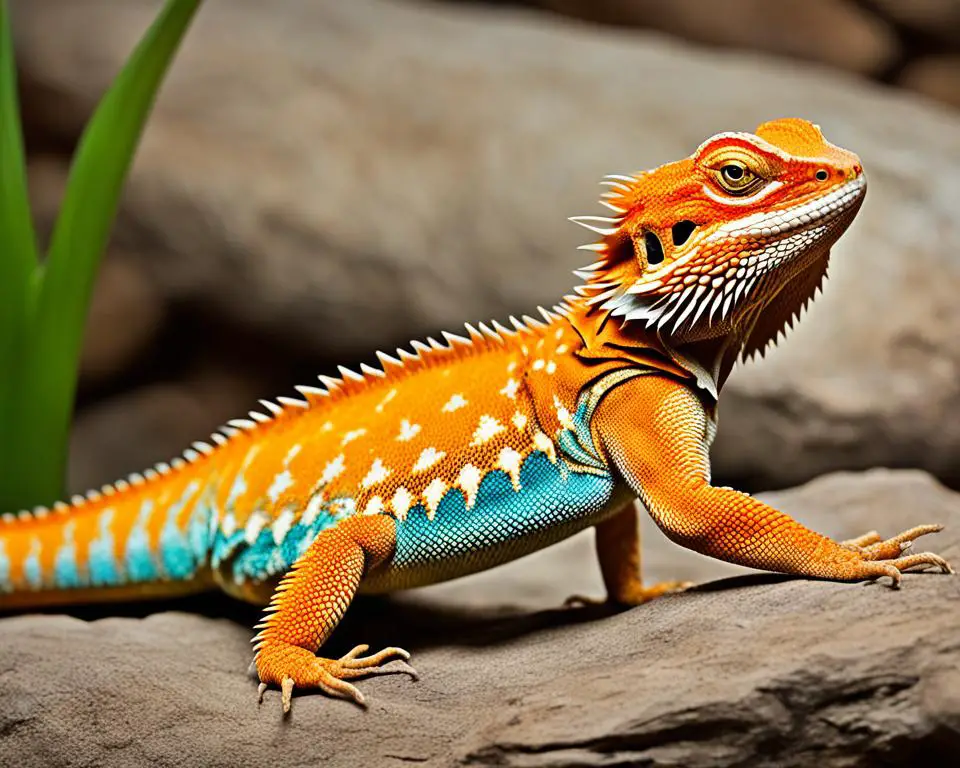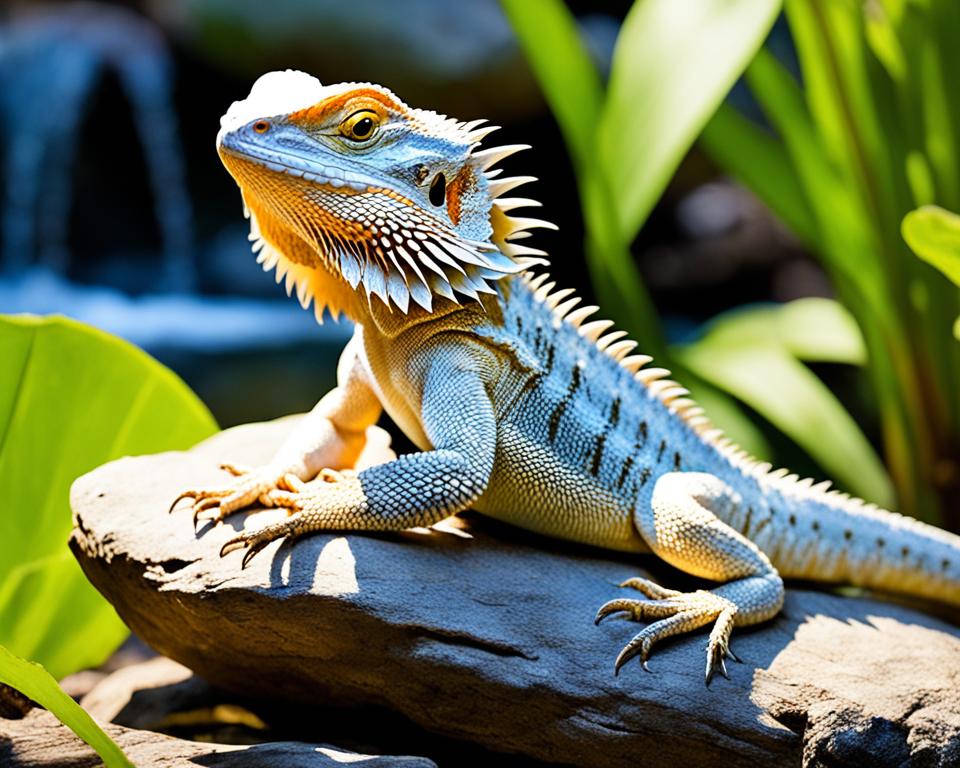Do you have a bearded dragon living with you? If so, you’ve probably noticed that his poop smells really bad. That’s what we’re going to discuss in this article.
Let’s dive in!
Bearded dragon poop smell
Bearded dragon poop can have a strong odor, and it can be worse if the dragon has parasites or is not eating a proper diet. If the poop smells particularly bad or is runny, it may be a sign of parasites, and a vet should be consulted.
However, it is normal for bearded dragon poop to have a strong smell, and it should not stink up the whole house.
Bearded dragon poop smell can be reduced by maintaining a clean habitat with regular spot cleaning and deep cleaning.
Use a reptile-safe disinfectant to clean the tank and accessories. Proper ventilation and the use of odor-absorbing materials like activated charcoal can also help minimize the smell.
Why does your bearded dragons poop smell so bad?
Bearded dragon poop smells bad due to their diet of insects and vegetables, leading to strong odors.
The waste contains bacteria that break down the food, resulting in the foul smell. Proper enclosure cleaning, feeding a balanced diet, and providing adequate hydration can help reduce the odor.
How to clean bearded dragon poop?
To effectively clean bearded dragon poop, follow these guidelines based on the information provided:
For Tile:
- Remove poop promptly and spot clean with a dilute solution of water and red vinegar (e.g., 9 parts water to 1 part red vinegar).
- Bake tiles at 250°F for 30–60 minutes to sterilize them, then allow them to cool overnight before placing them back in the habitat.
For Reptile Carpet:
- Have multiple carpets available to swap out weekly during cleaning.
- Spot clean with a mild, fragrance-free detergent.
- Deep clean by washing the carpets in the washing machine with fragrance-free detergent.
For Loose Particle Substrates (like calci-sand):
- Avoid using due to difficulty in complete removal of substrate particles and potential bacterial growth.
- If used, change frequently and carefully remove poop without disturbing other substrate.
Other Tips:
- Train your bearded dragon to defecate outside its enclosure, such as in a bathtub filled with warm water.
- Use pure coconut oil to remove tough residues from scales.
- Gently clean stubborn areas with a soft brush while the bearded dragon is in a bath.
Remember that regular cleaning is essential to maintain proper hygiene and ensure the health of your bearded dragon.
How often does a bearded dragon poop?
Bearded dragons can vary in how often they poop based on their age, diet, and other factors. Here is a general guideline:
- Baby bearded dragons (3 months or younger) typically poop 1-3 times per day.
- Young or juvenile bearded dragons (4-18 months old) may have a bowel movement every other day, slowing down to 1-2 movements per week as they approach 18 months.
- Adult bearded dragons (older than 18 months) can poop 1-7 times a week depending on their diet and other factors.
Factors such as diet, stress levels, and exposure to UVA and UVB light can influence how often a bearded dragon poops.
Monitoring your dragon’s overall health, energy levels, and appetite is essential to ensure they are healthy. If you notice any significant changes in their poop frequency or consistency, it may be wise to consult a veterinarian for further evaluation.
How do I control bad odors in a bearded dragon’s enclosure?
The best way to manage odor in a bearded dragon’s tank is to keep it clean. That means removing feces, uneaten food, or water in the tank for over a day.
That being said, washing your bearded dragon’s tank isin’t enough. You also need to bathe your beardie every week. This will help remove any dirt or grime accumulated on his skin.
When choosing a cleaner, choose one specifically made for reptiles like bearded dragons. Some people use baby wipes because they think they’re safe for animals.
However, most baby wipes contain chemicals that can irritate the skin and cause problems. That’s why we recommend products specifically made for bearded dragons.
How often should the bearded dragon’s enclosure be cleaned?
To keep your bearded dragon smelling fresh, you’ll need to clean its enclosure at least once per week.
It’s important to note that this doesn’t mean you need to wash the entire tank. Instead, focus on cleaning the areas where the bearded dragon spends most of his time.
For example, if your bearded dragon spends most of its time in the back corner of the tank, you only need to clean that part.
Cleaning the tank more often will help prevent bad odors from taking over. It will also create a healthier environment for your bearded dragon.
What should bearded dragon poop look like?
Bearded dragon poop should be firm, moist, and brown in color with a white chalky part. Any deviation from this could indicate health issues. Proper diet, hydration, and regular monitoring can help ensure healthy reptilian bowel movements.
How to make bearded dragon poop?
To help a bearded dragon poop, you can try the following methods based on the search results:
- Warm Bath: Place your bearded dragon in a warm bath with water at 100°F for 15-30 minutes. This can often prompt them to poop.
- Belly Massage: Gently massage your bearded dragon’s belly towards the vent after the warm bath to help stimulate bowel movements.
- Fruit Laxatives: You can try feeding your bearded dragon high-fiber fruit puree like pumpkin, apple sauce, or banana as a laxative.
- Olive Oil: If other methods don’t work, you can try feeding your beardie some olive oil for lubrication.
- Vet Visit: If your bearded dragon hasn’t pooped for an extended period, or if home remedies are ineffective, it’s essential to consult a vet for further evaluation and treatment3.
Remember, the frequency of bowel movements in bearded dragons varies with age and diet. Younger dragons may poop more frequently than adults, and diet plays a significant role in their digestion
Regular Deep Cleaning
The bearded dragon is one of the most popular reptiles kept as pets. They are known for being very intelligent creatures, recognizing human faces, and making sounds as humans do.
However, keeping a bearded dragon requires much attention because they are prone to skin infections. To keep your pet healthy and happy, cleaning his/her cage regularly is important.
A regular deep cleaning includes washing the cage’s walls, floor, and shelves twice weekly. This ensures that no bacteria are growing inside the dragon cage. You can use water and vinegar to wash the items, ensuring that everything is completely wet. Afterward, wipe down the surfaces with a damp cloth.
To avoid exposing your pet to smells, do not put anything into the tank that contains fragrances, such as perfume, cologne, laundry detergent, etc. Also, do not allow him/her to sniff objects that contain strong chemicals.
Summary
Before we move on to the conclusion, we’ve summarized this article into a short list of key points for you to remember:
- The best way to eliminate the smell in a bearded dragon’s cage is to keep it clean by removing feces, uneaten food, or water for more than a day.
- Bathing your bearded dragon weekly will help remove any dirt and grime accumulated on the skin.
- Regular deep cleaning is necessary to ensure no bacteria grow inside the cage.
- Do not expose your bearded dragon to scented items, such as perfume or other strong chemicals.
- If you have a large bearded dragon, make sure he has plenty of space to roam around.
- Make sure to provide your bearded dragon with an appropriate diet.
- Provide your bearded dragon with a comfortable temperature.
- Avoid using harsh chemicals when cleaning the cage.
Conclusion
In this article, we’ve learned the best ways to manage odor in a bearded dragon’s tank. We’ve also learned about the importance of regular deep cleaning.
Bearded dragons are fun and interesting pets. However, they are also very sensitive creatures. If you want to take good care of them, you must understand how to house them properly.
Want to learn more about bearded dragons?
Ready to boost your knowledge about your beardie? If so, check out our other articles below:
- How Many Crickets Should a Bearded Baby Dragon Eat? (Explained)
- What Bugs Can a Bearded Dragon Eat? ( 7 Must-Have Bugs)
- 9 Ways How to Tell If a Bearded Dragon is Scared (Solved)





